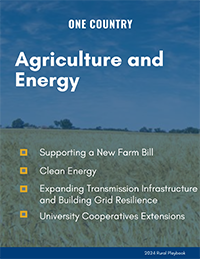
One Country Project’s mission is to ensure rural Americans' priorities and values are heard, understood, and well-represented in Washington. One Country’s Rural Playbook provides a guide to the issues impacting rural voters and how Democrats can best connect with them on the key issues of the economy, reproductive rights, workforce, family finances, energy, agriculture, and more in the run-up to Election Day 2024.
Building a Future For Working Families
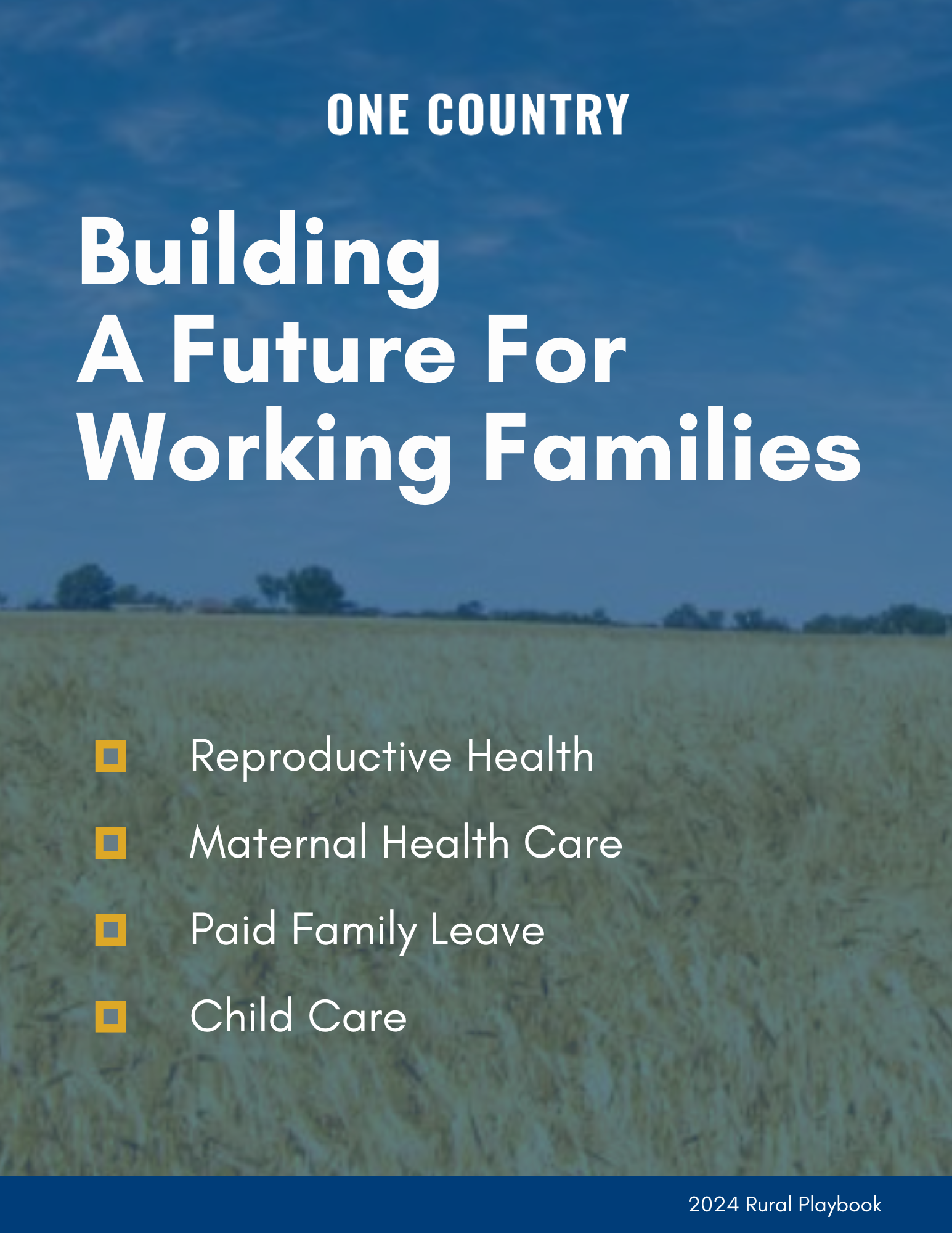 It’s not easy to raise a family in rural America. Couples can’t be certain they’ll have enough leave to welcome a new child to their family. Families with young children and aging parents face the stress of juggling multiple responsibilities while trying not to miss time at work. The cost of child care is burdensome, if child care is even available at all. Accessing healthcare often requires travel, particularly for specialists and advanced testing.
It’s not easy to raise a family in rural America. Couples can’t be certain they’ll have enough leave to welcome a new child to their family. Families with young children and aging parents face the stress of juggling multiple responsibilities while trying not to miss time at work. The cost of child care is burdensome, if child care is even available at all. Accessing healthcare often requires travel, particularly for specialists and advanced testing.
One Country supports plans that improve rural life and help rural residents feel they can have fulfilling lives in their rural communities, without having to relocate to larger metro areas. These include supports for child care, ensuring access to reproductive health, improving maternal health outcomes, and providing families the time they need to care for each other.
READ MORE ABOUT BUILDING A FUTURE FOR WORKING FAMILIES
Securing Communities' Safety and Well-being
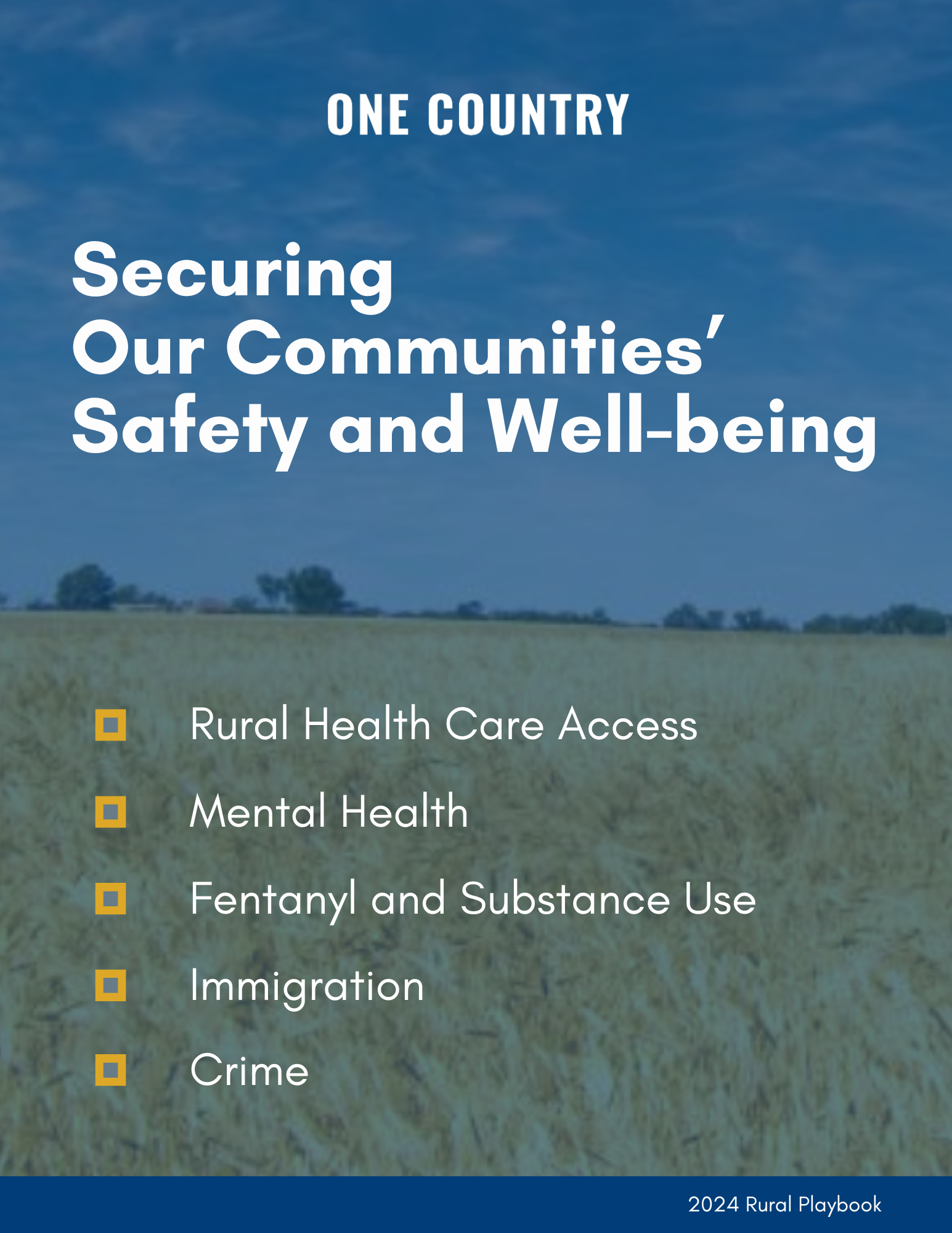 A sense of security comprises notions of both safety and certainty. Many rural communities have lost these twin notions. Hospital closures have disrupted communities that are grappling with a mental health crisis and rising substance use disorders. National politicians fan the flames of fear over uncertainty about immigration and crime.
A sense of security comprises notions of both safety and certainty. Many rural communities have lost these twin notions. Hospital closures have disrupted communities that are grappling with a mental health crisis and rising substance use disorders. National politicians fan the flames of fear over uncertainty about immigration and crime.
One Country seeks to bolster rural residents’ sense of safety and well-being in their own community. Policies that support mental health care, provide treatment plans for substance use disorders, and address immigration and crime can build physical health and ease community members’ minds about the security of their neighbors, building trust and confidence.
READ MORE ABOUT SECURING COMMUNITIES' SAFETY AND WELL-BEING
AGRICULTURE AND ENERGY
Two of our nation’s strongest industries that contribute to domestic self-sufficiency and worldwide exports are agriculture and energy, which have been the backbone of rural America’s economies for centuries. Critical to this continued success is supporting the programs and policies that recognize the contributions from rural workers and producers, value the rich resources these regions provide, and move us all forward through modernizing industry as we work to better acknowledge the challenges facing our planet.
This includes delivering a Farm Bill, expanding clean energy investments, growing our rural education opportunities for the next generation, and creating a space for equity. In the face of repeated adversities, resilience and innovation are key elements of the response from rural areas and they have continued to deliver for America. We need to appreciate and support that spirit for our country’s success.
STIMULATING THE RURAL ECONOMY
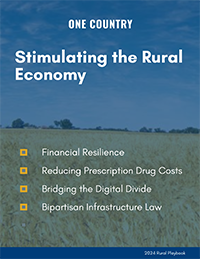 Rural America faces significant economic challenges that require a comprehensive policy approach to revitalize communities and create new opportunities. A multifaceted strategy is necessary to address the complex issues affecting these areas and to foster sustainable growth and development.
Rural America faces significant economic challenges that require a comprehensive policy approach to revitalize communities and create new opportunities. A multifaceted strategy is necessary to address the complex issues affecting these areas and to foster sustainable growth and development.
Economic diversification is crucial for the long-term stability of rural regions. This involves attracting new industries, particularly in emerging sectors such as clean energy, advanced manufacturing, and technology. Additionally, supporting local entrepreneurs and small businesses through improved access to capital, mentorship programs, and targeted tax incentives can help stimulate economic activity. Workforce development initiatives, including skills training and apprenticeship programs, are also essential to ensure rural residents are prepared for evolving job markets.
Addressing healthcare costs, particularly prescription drug prices, is a critical component of improving rural quality of life. Implementing rural-specific drug pricing models, expanding eligibility for assistance programs, and exploring innovative solutions like community-owned pharmacies could help alleviate this burden. Simultaneously, closing the digital divide by expanding broadband infrastructure is vital for rural economic competitiveness. This can be achieved through increased funding for rural broadband initiatives, public-private partnerships, and support for community-owned networks.
Investing in rural infrastructure is fundamental to creating a foundation for economic growth. This includes modernizing transportation networks, water and wastewater systems, and electrical grids. Such improvements not only enhance the quality of life for current residents but also make rural areas more attractive for business investment and population retention. By implementing these comprehensive measures, policymakers can help create a more resilient and prosperous rural America, contributing to the overall economic strength of the nation.
EDUCATING AND TRAINING OUR FUTURE WORKERS
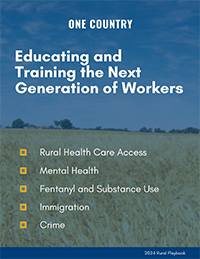 Focusing on political distractions does absolutely nothing to address the real issues facing education across our country. It doesn’t close the achievement gap, it doesn’t recruit bright young minds into the field of education, it doesn’t address the number of underappreciated and under supported educators choosing to leave the profession, and it certainly doesn’t improve the quality of meaningful content taught in our classrooms. And the policies put forward in Project 2025 do not reflect the realities of education and workforce needs in rural America.
Focusing on political distractions does absolutely nothing to address the real issues facing education across our country. It doesn’t close the achievement gap, it doesn’t recruit bright young minds into the field of education, it doesn’t address the number of underappreciated and under supported educators choosing to leave the profession, and it certainly doesn’t improve the quality of meaningful content taught in our classrooms. And the policies put forward in Project 2025 do not reflect the realities of education and workforce needs in rural America.
While private schools should continue to have a place in our education system, school vouchers are not the solution to the challenges in American education. This policy sells short the future of rural America by diverting funds and commitment from our public schools towards private entities seeking profit. More rural primary and secondary schools are forced to make the difficult decision to consolidate across neighboring communities to ensure there is an accessible and staffed school within a reasonable radius (and unfortunately, sometimes not). There is absolutely no evidence to support the assertion that a private for profit school could enter these regions that face complex challenges and reflect the community in the same way as their local public school.
Without a strong school system, rural communities cannot train the next generation of workers, lose a strong social backbone, and struggle to attract and grow families. The decline of a rural school district has a direct impact on the future of the rural community it serves. Communities that lose their local public school often face precipitous drops in populations as the declining services to the community drive more and more families away to live closer to the school their children attend.
We need to invest more in public education, do better to recruit and retain our educator pipeline, and ensure that the quality of learning for rural students is prioritized. Additionally, education beyond primary and secondary school needs to be affordable and reflect the needs of our workforce. This includes supporting college tuition support, technical schools, and apprenticeships.


